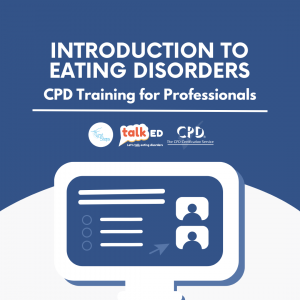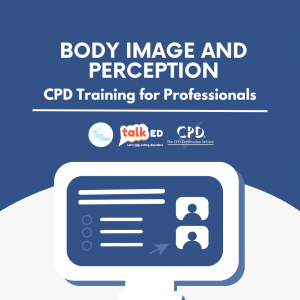Raising awareness for early intervention and prevention of eating disorders.
First Steps ED’s CPD accredited foundation courses aim to raise awareness and knowledge about eating disorders and disordered eating. Each course demonstrates a range of information and support tools that can be adopted in various professional settings. Whilst they may not train you in a specific diagnosis, the training will equip you with the information and skills to spot the signs and take an evidence-based approach to support someone at risk of eating difficulties and eating disorders.
Introduction to Eating Disorders – £49
Whilst eating disorders are complex, understanding the clinical presentations can help promote early interventions and prevention, which is why our ‘Introduction to Eating Disorders’ CPD-accredited training was developed. This foundation course offers delegates a greater understanding of eating disorders, the signs and symptoms to look out for, as well as an insight into recovery.
–
Body Image and Perception- £49
Our ‘Body Image and Perception’ CPD accredited training offers delegates a deeper understanding of the relationship an individual has with their body and how that relationship can impact them throughout their lifetime. Together we will discuss the risk factors of developing a negative body image and supporting strategies that can be implemented to offer support in any sector and setting.
Eating Disorders in Boys and Men – £49
Our ‘Eating Disorders in Boys and Men’ is an animated training workshop originally developed by the University of Nottingham, Kings College London and First Steps ED. The aim was to raise the profile about eating disorders in boys and men and improve understanding of and care for this patient group, as well as reflect upon aspects of primary care to make everyday practice easier for both professionals and sufferer.
–
Eating Disorders and Exercise Addiction – £49
Compulsive Exercise may be defined as exercise that significantly interferes with important activities, occurs at inappropriate times or settings, or continued exercise despite injury or medical complications (Lichtenstein et al. 2017). It is a symptom common across many eating disorders, where individuals may use excessive exercise to control their body weight or compensate for binge-eating episodes, whilst others use compulsive exercise to achieve further weight loss.
Raising awareness for early intervention and prevention of eating disorders.
First Steps ED’s CPD accredited foundation courses aim to raise awareness and knowledge about eating disorders and disordered eating. Each course demonstrates a range of information and support tools that can be adopted in various professional settings. Whilst they may not train you in a specific diagnosis, the training will equip you with the information and skills to spot the signs and take an evidence-based approach to support someone at risk of eating difficulties and eating disorders.
Our team.
Our team understands what it takes to support someone struggling with an eating disorder, and it all starts with the right knowledge and training. We believe in early intervention and trust that better education around disordered eating behaviours can play an important role in protecting those who are at risk of developing an eating disorder, as well as offer effective support to those who are struggling with their relationship with food.
Each one of our trainers have experience in delivering our CPD modules both online and in-person, providing confidence in organisations and individuals who choose our ‘Skills for Eating Disorder Support’ training programme.
Courses:
Our CPD-accredited course are aimed at students and professionals who may encounter vulnerable adults or children who could be at risk of developing disordered eating thoughts or behaviours. Each module is 90 minutes long and delivered online (via Microsoft Teams) by our team of trained professionals. Each module will give you a greater understanding of the chosen topic, as well as more practical advice on supporting someone with eating difficulties.





